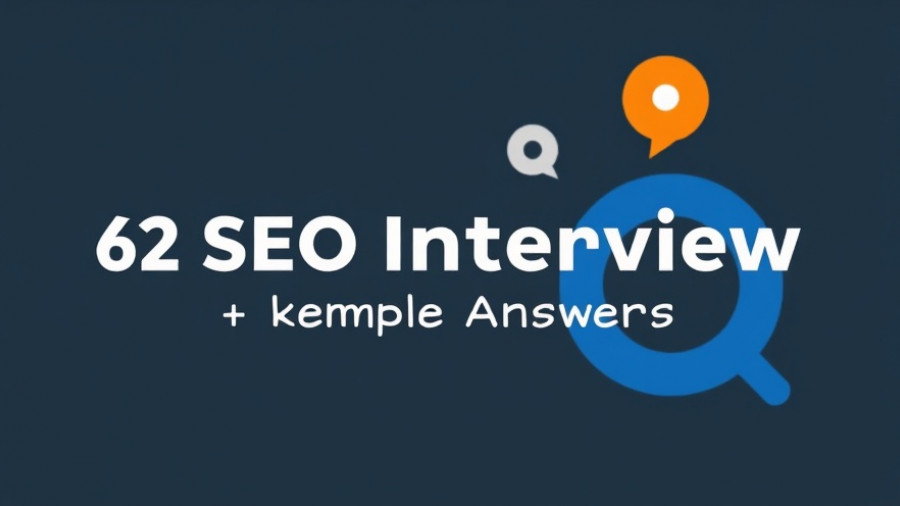
Understand the Importance of Google Business Profile Photos
When potential customers search for your business on Google, your Google Business Profile (GBP) photos play a crucial role in influencing their first impression. These images make your listing more visually appealing, compelling viewers to learn more about your offerings. In today's competitive landscape, having high-quality images can be the difference between attracting or losing a customer.
Essential Image Size Guidelines for Business Success
To ensure that your images appear correctly and effectively convey your brand, adhering to specific guidelines is critical. Below are the recommended sizes for different types of images in your GBP listing:
- Cover Photo: The cover photo should ideally be 1024 × 576 px with a minimum size of 480 × 270 px. The aspect ratio must be 16:9.
- Logo: Your logo should be 720 × 720 px at a minimum of 250 × 250 px and maintain a 1:1 aspect ratio.
- Business Photos: Each business photo should be 720 × 720 px with a minimum of 400 × 300 px and a 4:3 aspect ratio.
- Post Photos: For post images, the recommended size is 1200 × 900 px, with a minimum of 400 × 300 px, following the 4:3 aspect ratio.
- Product Photos: Similar to post photos, product images should be 1200 × 900 px with a minimum of 400 × 300 px, also adhering to a 4:3 aspect ratio.
Maximizing the Effectiveness of Your Cover Photo
Your cover photo is often the first thing potential customers notice. Therefore, it's essential to choose an image that not only represents your business but also draws attention. Best practices for selecting a cover photo include:
- Utilizing a clear image of your storefront or team, rather than stock images or logos.
- Taking photos in natural lighting to enhance visibility and presentation.
- Avoiding text overlays, as Google may crop these elements depending on the screen size.
- Focusing on wide shots that capture the entirety of your space while ensuring the main subject is centered.
Exploring the Benefits of Quality Images on Your GBP
High-quality images can render multiple benefits for small to medium-sized businesses. Not only do they enhance the aesthetic appeal of your listing, but they also contribute to building trust with your audience. Customers are more likely to engage with businesses that showcase professional and inviting visuals.
Considering Current Trends in Visual Marketing
As visual platforms continue to dominate social media and digital marketing, businesses must adapt their strategies accordingly. Studies indicate that consumers are 64% more likely to purchase a product after viewing a compelling image. The ability to showcase products and the business environment through images significantly supports the purchasing decision, especially in local searches.
Tips for Creating Engaging Business Photos
Creating engaging business photos doesn’t necessarily require professional equipment. Here are some practical tips to help you craft high-quality images:
- Utilize smartphone cameras that are equipped with advanced technology.
- Emphasize product details and distinctive features.
- Engage with your team during photoshoots, portraying a welcoming atmosphere.
Common Challenges with Google Business Profile Photos
Despite the advantages, many businesses face challenges with their GBP photos. A common issue includes improper sizing resulting in blurry or cropped images. Frequent updates to Google's guidelines may also cause confusion. Staying informed about these changes can help ensure your business presents itself in the best light possible.
Final Insights: The Value of Visual Storytelling
Your GBP photos act as a powerful form of visual storytelling. By adhering to recommended sizes and best practices, you can significantly enhance customer engagement and trust. In a digital age where visuals reign supreme, investing effort into quality images can elevate your business’s credibility and visibility.
To maximize your photography efforts, consider regular updates and professional photography services if possible. Taking these steps can further improve your online presence and customer interactions.
Call to Action
Take a moment to review your Google Business Profile images today. Are they high quality? Are they sized correctly? If not, make it a priority to update them to attract more potential customers to your business.
 Add Row
Add Row  Add
Add 



Write A Comment